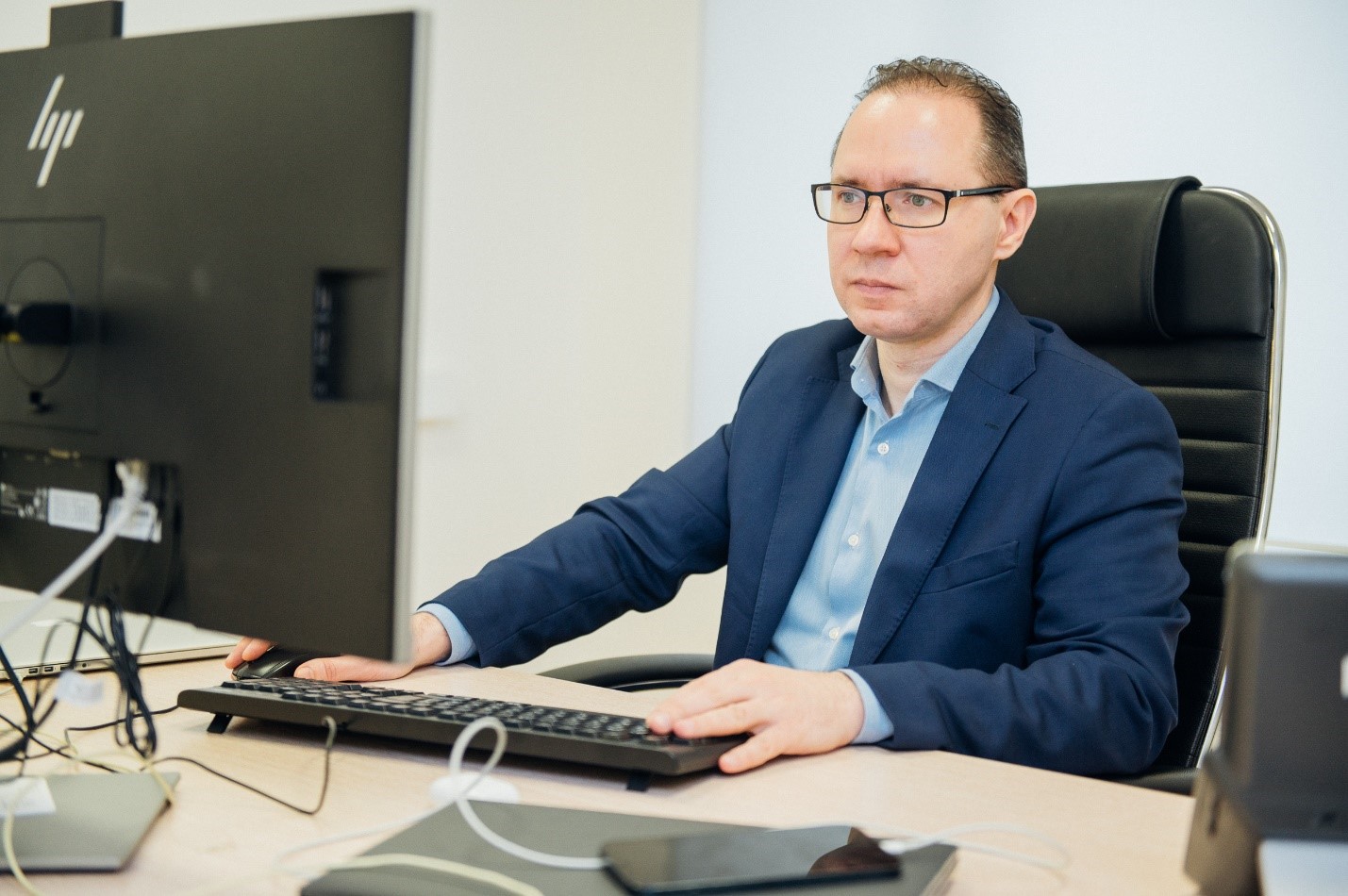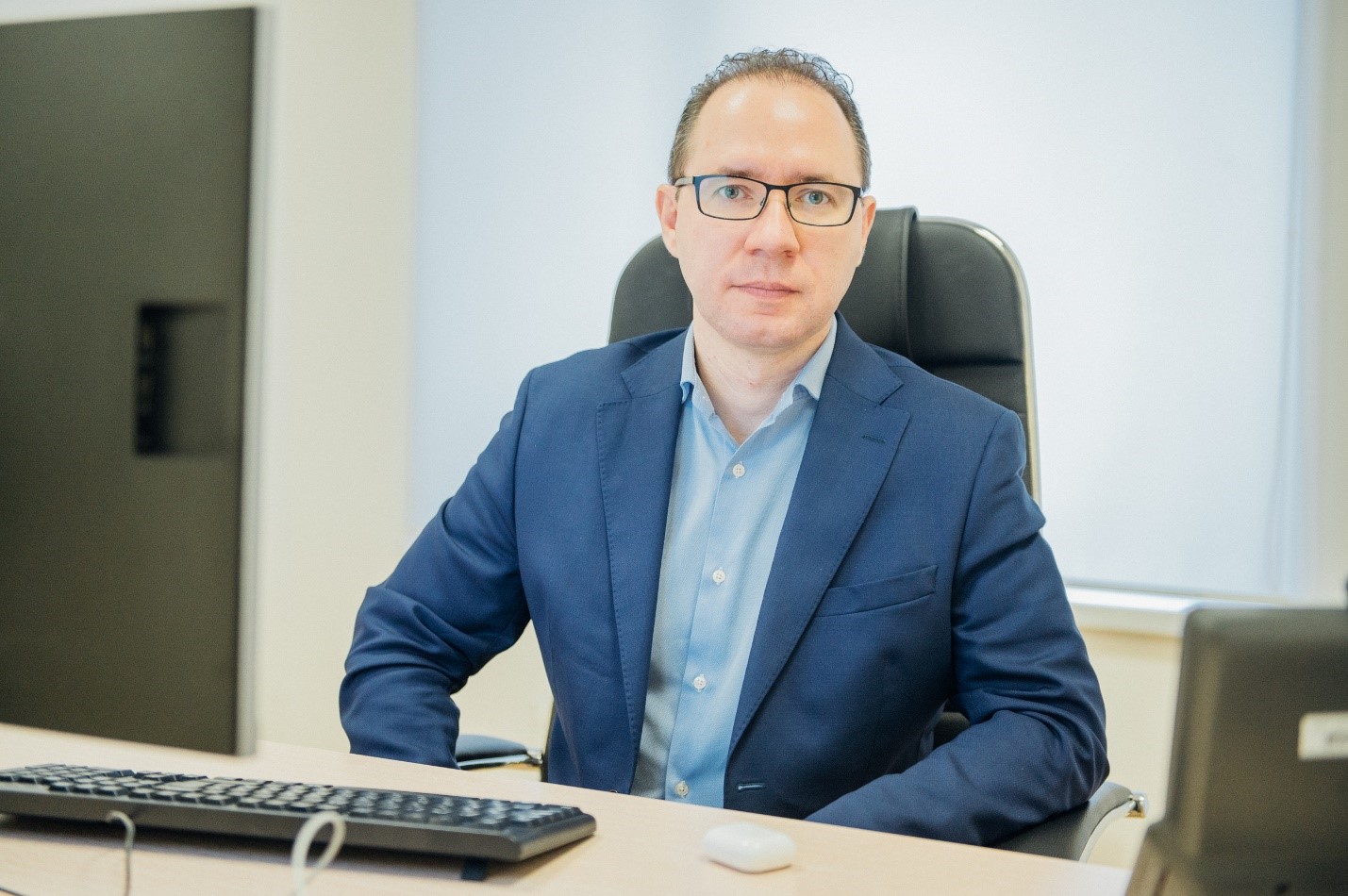'We’re Moving On to the Next Stage of Digital Transformation'
%20(1).jpg)
Dmitry Bondar has served as Senior Director for Digital Transformation at HSE University since January 2021. Since then, the university has introduced and developed numerous new, state-of-the-art information systems. Dmitry Bondar is responsible for ensuring high rates of digital transformation and the good performance of HSE's IT Office. In his interview, he speaks about the integration of new information systems, project management at the IT Office, import substitution in IT, engaging with students, and plans for the current year.
— HSE is a university committed to continually improving its digital environment. What new information systems have been launched in the past year?
— Currently, the university is working to automate its primary business processes in a comprehensive manner. In 2022, several teams collaborated to implement a number of systems, including those for managing admissions, engaging with partners, applicants and contractors, developing academic programmes, and handling procurement and financial accounting.
Our plans for this year include the implementation of several new foundational systems, such as HSE.Reg for managing student records, the Marketplace for educational products, MVP for continuing professional education, microdegree and online courses, the Joint Economic and Social Archive platform for consolidating research across various fields of science, and SmartPro, a system for automating students’ practical training. In fact, we are nearing completion of the comprehensive automation stage. This will stabilise the university's IT landscape, enabling us to advance to the next stage of digital transformation.
— What challenges do you anticipate the IT Office will encounter along the way?
— The previous stage was the most challenging one for the university. During that period, the new interfaces did not necessarily provide benefits for regular users; on the contrary, they could instead add complexity to their work. However, advancing to the next stage would have been impossible without the development and implementation of foundational information systems. The work ahead will be equally labour-intensive, but this time, the changes will have a more substantial impact on both the university's overall performance and individual users.

'We need to be pioneers in the implementation and application of domestically produced digital solutions'
— Import substitution in IT is a major priority for Russian universities today. What processes have been initiated at HSE in this regard and which ones do you anticipate will start shortly?
— Currently, the university is confronted with the unavailability of services and software from foreign manufacturers, coupled with an increase in legislative measures that require the use of domestic IT solutions. Often, we need to be pioneers in the implementation and application of domestically produced digital solutions in the educational process.
In January 2023, the IT Office uploaded a section to the HSE University's website with a list of digital services to be replaced by domestically developed solutions and the current status of their substitution
'Future human resources for the Digital Economy'
— The IT Office is a major employer. Can you tell us about your projects that aim to involve HSE students?
— Students are the most valuable resource of any university. We are particularly committed to engaging proactively with the student community.
For example, last summer, we launched the first enrolment in the IT Staff Development Programme. This internship programme offers students interested in pursuing digital professions an opportunity to start their careers in the IT industry. Students gain an insight into what it takes to practice their chosen IT profession, while also acquiring new competencies, knowledge, and skills in the field.
Based on the results of the pilot enrolment, two students were invited to join the IT Office team. We are currently conducting a second enrolment and looking forward to welcoming more talented students to the IT Office.

Another important project is the HSE University Digital Assistants. The project was initially launched to assist individuals who faced challenges in using digital technology during the pandemic.
Today, the Digital Assistants not only provide assistance and advice in Russian and English through the student-operated Hotline, but they also offer support during online events, work with digital product teams, and even provide digital support outside of the university
They collaborate with charitable foundations through digital volunteering, conduct masterclasses on digital literacy and culture, and provide support for major external online events. Moreover, digital volunteering opens up career opportunities: five students from various courses and programmes have joined the IT Office.
After gaining experience working with our team, many Digital Assistants have been hired by large IT companies. We are pleased to see our students as valuable human resources for the digital economy. We are committed to sharing our positive experience with other Russian universities through our university partnership programme. This will enable our colleagues to launch similar projects at their own institutions.
Our plans for the near future include the launch of a socially significant project called 'Supporting Digital Access to Education for People with Disabilities', which also involves the Student Council's Digitalisation Committee, Digital Assistants, and HSE students with disabilities. We still have a lot of work ahead of us to achieve our overall goals and to develop new ideas and plans for further advancing the university's digital environment.
See also:
First Digital Adult Reading Test Available on RuStore
HSE University's Centre for Language and Brain has developed the first standardised tool for assessing Russian reading skills in adults—the LexiMetr-A test. The test is now available digitally on the RuStore platform. This application allows for a quick and effective diagnosis of reading disorders, including dyslexia, in people aged 18 and older.
HSE Scientists Explain How to Identify Brain Areas Critical for Language Function During Surgery
The HSE Centre for Language and Brain conducted a course on tractography, a method that enables visualisation of key brain connections and helps surgeons avoid damaging language-critical areas during surgery. The course was attended by neurosurgeons and radiologists from Moscow and other Russian regions who are interested in methods of preoperative language mapping.
Forbes University Ranking: HSE Has Top Reputation among Employers
On May 22, Forbes Education released its updated ranking of the 100 best universities in Russia for 2025. HSE University retained its second-place position, having established itself as the university with the highest employer reputation. Among the top 20 were 12 universities from Moscow, three from St Petersburg, two from Tatarstan, and one each from the Sverdlovsk, Novosibirsk, and Tomsk regions.
HSE and Sichuan University Sign Cooperation Agreement
On May 20, 2025, HSE University hosted an official delegation from Sichuan University headed by President Wang Jinsong. During the meeting, the universities signed a cooperation agreement.
Interactive Workshops, Thematic Quizzes, and New Partnerships: HSE Delegation Visits Mongolia
Representatives of HSE University visited the Mongolian capital, Ulaanbaatar. The visit focused on developing cooperation in the fields of education and science, as well as introducing Mongolian school pupils and students to the educational opportunities available at one of Russia’s leading universities.
'The Branch of Medicine That Our Developments Primarily Target Is Cardiology'
The application of mathematical models to the diagnosis and treatment of cardiovascular diseases contributes to the effective detection of patient predispositions and supports the selection of best treatment strategies. The use of mathematical models helps create new diagnostic tools and train neural networks to assist clinicians. Researchers from HSE University and colleagues from Saratov State Medical University are engaged in this work as part of the Mirror Laboratories project. In this interview, Natalya Stankevich, Senior Research Fellow at the International Laboratory of Dynamical Systems and Applications of the HSE Campus in Nizhny Novgorod, talks about what the collaboration has achieved so far.
Centre for Language and Brain Begins Cooperation with Academy of Sciences of Sakha Republic
HSE University's Centre for Language and Brain and the Academy of Sciences of the Republic of Sakha (Yakutia) have signed a partnership agreement, opening up new opportunities for research on the region's understudied languages and bilingualism. Thanks to modern methods, such as eye tracking and neuroimaging, scientists will be able to answer questions about how bilingualism works at the brain level.
HSE and Vietnam National University to Establish Joint Research Institute
A cooperation agreement has been signed in Moscow between HSE University and Vietnam National University, Hanoi (VNU). The document was signed during the official visit of a Vietnamese delegation to celebrations marking the 80th anniversary of Victory Day and negotiations involving President of the Russian Federation Vladimir Putin and General Secretary of the Central Committee of the Communist Party of Vietnam Tô Lâm. The agreement was signed by HSE Rector Nikita Anisimov and VNU Rector Le Quan.
HSE and Tsinghua University Strengthen Russia–China Partnership as part of Cross Year of Education
On May 10, a delegation from Tsinghua University—one of China’s leading higher education institutions—paid an official visit to HSE University. The delegation was led by Qiu Yong, Secretary of the CPC Tsinghua University Committee, former President and Chair of the University Council, and member of the Chinese Academy of Sciences.
HSE University Signs Cooperation Agreements with Leading Chinese Universities
On May 8, 2025, in Moscow, in the presence of Russian President Vladimir Putin and Chinese President Xi Jinping, strategic agreements were signed between the HSE University and two of China's top institutions, Peking University and Tsinghua University. The event was attended by Nikita Anisimov, Rector of HSE University, Qiu Yong, Secretary of the CPC Tsinghua University Committee, and Gong Qihuang, President of Peking University. The signing unfolded during the official visit of the Chinese delegation to Russia, coinciding with the commemoration of the 80th Anniversary of Victory Day.


